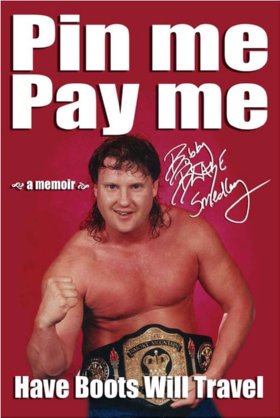Sometimes you sit down to read a book about someone you don’t know well, and by the end of it, you feel you know the person.
That’s certainly the case for Bobby Blaze’s self-published autobiography, Pin Me, Pay Me, Have Boots Will Travel.
Blaze — real name Bobby Smedley — has a great style that engages you and lets you re-live countless stories from his couple of decades in and around the professional wrestling business.

But the first you have to get past the initial thought: “Who’s Bobby Blaze?”
He was never a big name on the national scene, though in the late 1990s, he was a regular on WCW programming, primarily as high-quality enhancement talent.
His biggest claim to fame was being the champion in Jim Cornette’s Smokey Mountain Wrestling promotion for a brief while in 1995, but he’s wrestled everywhere from the Canadian Maritimes to Japan to Australia to England to South Africa.Blaze’s enthusiasm is contagious, as he takes us from learning the ropes in Ashland, Kentucky, to entering the school run by The Great Malenko, and his sons Dean and Joe, in Florida, where his true wrestling education took place. The insight into Boris Malenko is great.
The moment where he realizes, “Hey, I belong in this dance” is a revealing look at the steps it takes to really grasp how to perform as a pro wrestler. And because we go through his own personal journey into learning the skills, when he rants on those who are not trained properly or don’t give respect to their elders in the business, it works and means something.
He has no delusions about his accomplishments in wrestling, reflected both in the title, Pin Me, Pay Me, repeated throughout, and in his advice: “You know your role and you accept it, and you do it, performing at your very best. You play the role you are given. It’s not you getting beat, it’s just a character or a role, it’s a work, it’s your work, you do your job, just like everybody else does their job. You do what is expected of you.”
There are many funny stories to go along with his saga, from escaping South Africa, to fighting midget wrestlers, to scoring hash with the late Goldie Rogers. Blaze doesn’t shy away from the drugs, but he was never a big drug user either. The biggest flaw with this subject though comes in the section with all the wrestlers who have passed, and his memories of them. By never mentioning what people died from (or when, for that matter), it leaves the reader questioning his allegations that the business is so tough on the body.
Having talked to Blaze a few times on the phone, in particular over the passing of Chuck Conley of the Scufflin’ Hillbillies, it was particularly amusing when he apologizes early on for the language and rude stories to come, as that is what the wrestling business was (and is?), compared to his very polite Southern boy nature.
The images don’t all reproduce great, but the inclusion of contracts from Japan and WCW, as well as an example of a WCW paystub, are nice touches.Speaking of WCW, Eric Bischoff is really the only person that Blaze bashes at all. “How can I have respect for someone on some egotistical power trip who showed me, and a bunch of others very little respect if any at all in return?” Blaze rants. “The guy had a walnut sized brain and the personality of a well used dish rag and the physical courage of a weak-gutted schoolgirl.”
Is the book perfect? No. Just as Blaze didn’t quite have what it took to be a full-time main eventer — lacking height for one thing — the book could have used a real tightening to avoid some duplication. Blaze has a tendency to praise and thank his friends and contacts again and again as well.
Yet there is a relatively happy ending too. When he was advised by a doctor not to wrestle any longer, Blaze went back to school, and seems very content with his life.
As well he should be — Pin Me, Pay Me, Have Boots Will Travel proves that he lived an interesting, entertaining life.

